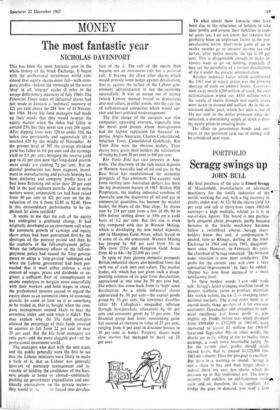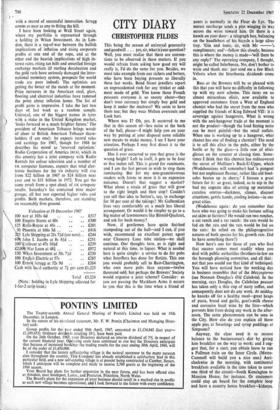Scragg swings up
PORTFOLIO JOHN BULL
My final purchase of the year is Ernest Scragg of Macclesfield, manufacturer of advanced machinery for the textile industries of the world, working flat out, with a big recovery in profits under way. At 52s 9d the shares yield 3.4 per cent and sell at thirty-four times 1965-66 earnings—a high multiple, related as it is to out-of-date figures. The board is not particu- larly eloquent about prospects, partly because fortunes in the textile machinery business follow a switchback course. Scragg share holders know this and, if confirmation is needed, turn to Klinger, darling of the Sock Exchange in 1964 and early 1965, disapiOint- ment since. However, in February thi' year, the chairman of Scragg remarked: 'The forward order situation is now most satisfactory. The profit for the current year will show a very substantial improvement.' In June, he added : 'Output has now been increased to a most satisfactory level.
To these modest words I can add trade talk. Scragg's latest crimping machine (used to process synthetic yarns to produce materials like stretch nylon), the cs 12, is sweeping inter- national markets. The group order book is at record levels, three quarters of it for overseas customers. Devaluation adds cheapness to tech- nical excellence and leaves profit re.. gins slightly up. Profits before tax, which dropped from £969,000 to £352,000 in 1965-66, have recovered to almost £1 million for 1966-67 (year-end September 30)—in other words, the shares are really selling at ten to twelve times earnings, a much more reasonable rating. As for the current year, • profits should reach record levels, that is, exceed £1,125,000 (the 1963-64 outturn). Thus the prospect is excellent. But there is a warning to sound : Scragg is not a share to buy and then forget about— indeed, there are very few shares which do measure up to this traditional test. The textile industry still exhibits an old-fashioned trade" cycle and so, therefore, do its suppliers. To bridge the gaps in demand, you need a firm
with a record of successful innovation. Scragg comes as near as any to fitting the bill
I have been looking at Wall Street again, where my portfolio is represented through a holding in Witan Investment. As in Lon- don, there is a tug-of-war between the bullish implications of inflation and rising corporate profits at one end of the rope, and at the other end the bearish implications of high in- terest rates, rising tax bills and unsettled foreign exchange markets (if sterling devaluation and the gold rush have seriously damaged the inter- national monetary system, prospects for world trade are poor indeed). The optimists are getting the better of the match at the moment. Price increases in the 'American steel, glass, flooring and electrical industries have rammed the point about inflation home. The list of profit gains is impressive. I take the last two days of last week as a random sample. Uniroyal, one of the biggest names in tyres with a stake in the United Kingdom market, `looks forward to a much brighter future.' The president of American Tobacco brings words of cheer to British American Tobacco share- holders (I am one): he expects record sales and earnings for 1967, though for 1968 he describes his mood as `reserved optimism.' Radio Corporation of America (RCA), which in this country has a joint company with Radio Rentals for colour television and a number of ux computer licensees, expects that total elec- tronic business for the us industry will rise from $22 billion in 1967 to $24 billion next year and to $31 billion in 1972. You get the same result from a spot check of UK company results. Saturday's list contained nine major groups; all but two reported higher sales and profits. Both markets, therefore, are standing on reasonably firm ground.
Valuation at 19 December 1967
100 BAT at 103s 6d
£517 100 Empire Stores at 60s £300 \ 125 Rolls-Royce at 45s £281 \50 Phoenix at 166s 3d . £416 5 Lyle Shipping at 21s 71d (see note).. £244 6 John I. Jacobs at 8s 4id £251
100,Unilever at 47s 101d
£239 £2,0013 War Loan at 48- £972 150 Witan Investment at 30s 711 £230 100 English Electric at 57s .. £285 100 Ernest Scragg at 52s 9d £264 Cash with local authority at 71 per cent £1,225 Total £5,224 (Note: holding in Lyle Shipping adjusted for 1-for-2 scrip issue.)



































 Previous page
Previous page